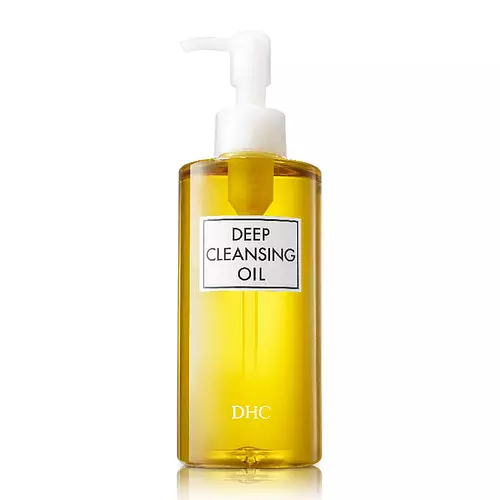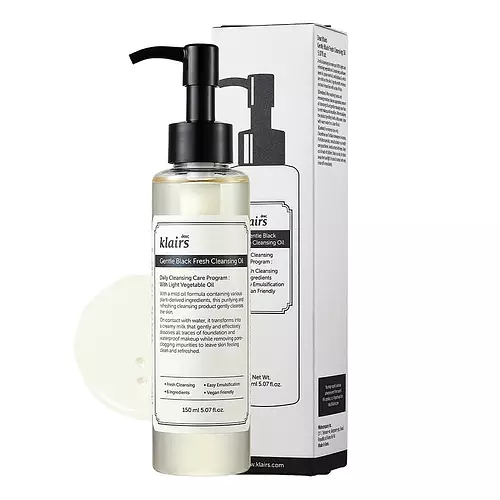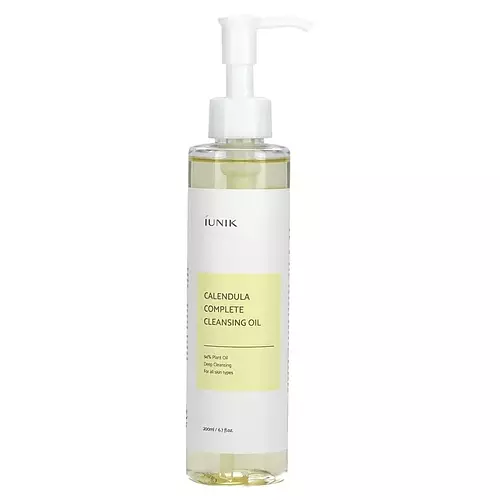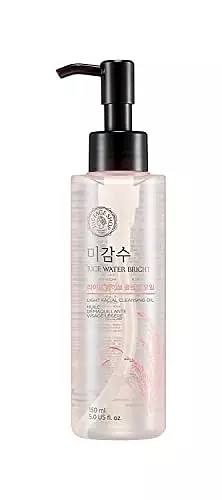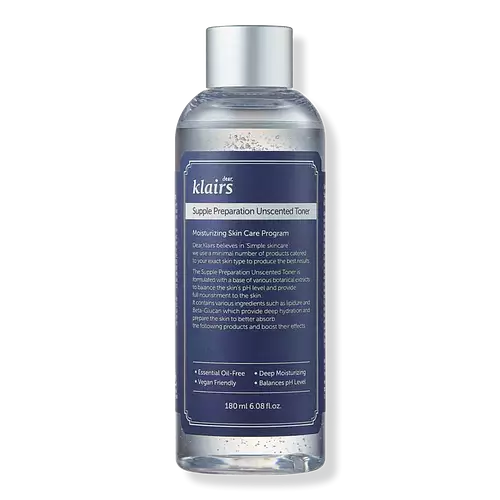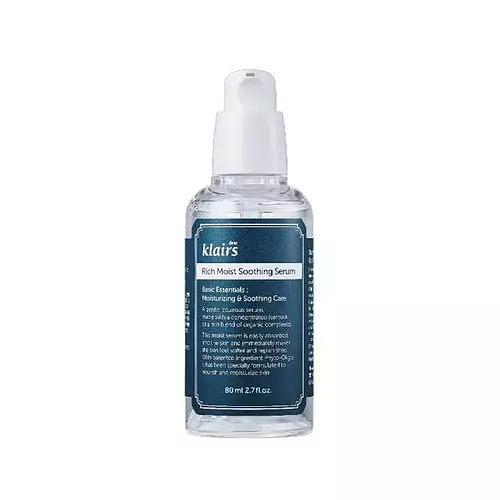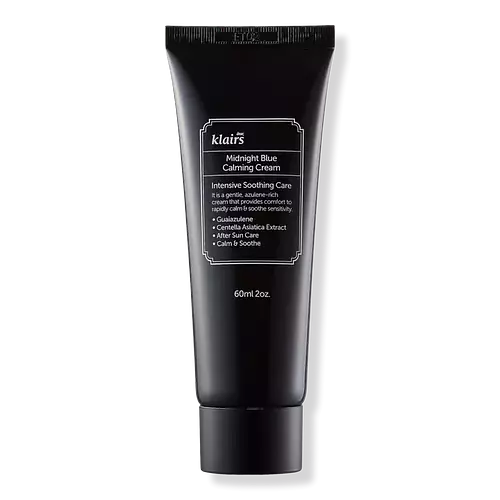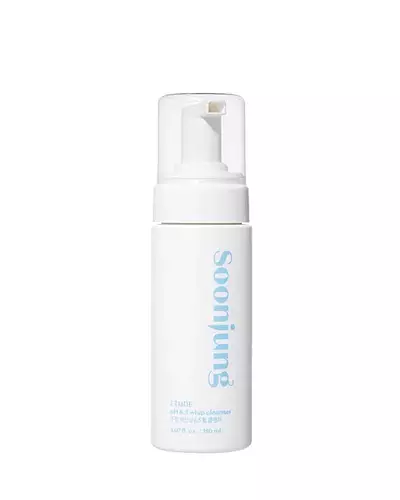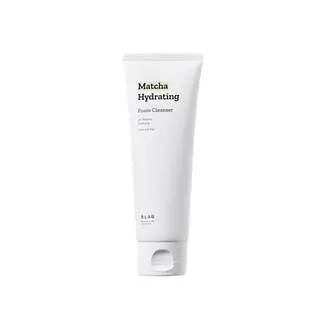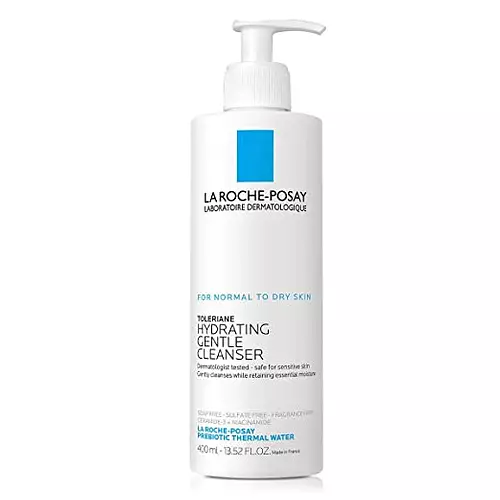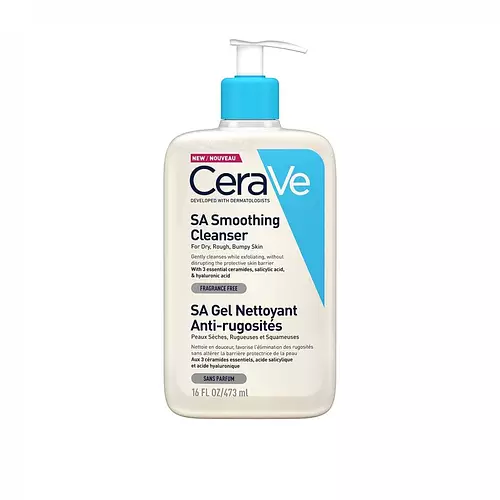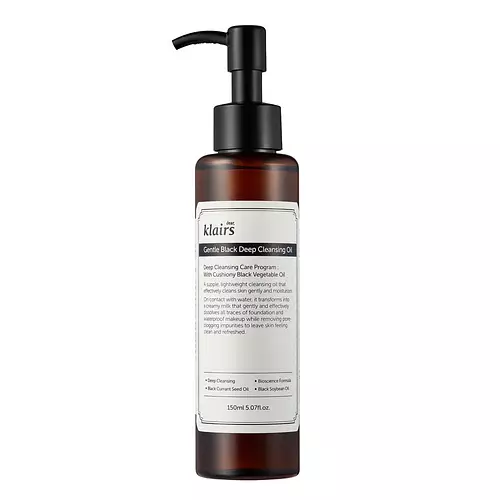
Dear, Klairs Gentle Black Deep Cleansing Oil Ingredients Explained
Overview
What it is
Face cleanser with 16 ingredients that contains Vitamin E
Cool Features
It is vegan, cruelty-free, and reef safe
Suited For
It has ingredients that are good for dry skin and brightening skin
Free From
It doesn't contain any harsh alcohols, common allergens, parabens, silicones or sulfates
Fun facts
Dear, Klairs is from South Korea. This product is used in 132 routines created by our community.
We independently verify ingredients and our claims are backed by peer-reviewed research. Does this product need an update? Let us know.
Face cleanser with 16 ingredients that contains Vitamin E
Quick info
You should know
Notable Ingredients
This product contains 1 ingredient that may have this attribute:
Benefits
This product contains 2 ingredients that may have this attribute:
This product contains 1 ingredient that may have this attribute:
Concerns
This product contains 1 ingredient that may have this attribute:
This product contains 2 ingredients that may have this attribute:
This product contains 1 ingredient that may have this attribute:
This product contains 1 ingredient that may have this attribute:
This product contains 1 ingredient that may have this attribute:
Ingredients 16
Caprylic/Capric Triglyceride is an emollient, solvent, and texture enhancer. It is considered a skin-softener by helping the skin prevent moisture loss.
Isononyl Isononanoate is a synthetic skin-conditioner and texture enhancer. It is created from nonanoic acid, a fatty acid found in cocoa and lavender oil.
Peg-7 Glyceryl Cocoate is created from polyethylene glycol and fatty acids from coconut oil.
Isopropyl Myristate is an emollient, thickening agent, and texture enhancer. It is created from isopropyl alcohol and myristic acid.
This ingredient is the fixed oil extracted from seeds of the desert shrub Jojoba. It is more commonly known as jojoba oil. The seed oil is liquid wax ester from the plant. It is non-comedogenic.
Glycine Soja Oil comes from the soybean. Glycine Soja is native to eastern Asia.
Sesame oil comes from sesame seeds. Sesame oil is rich in fatty acids and Vitamin E.
Ribes Nigrum Seed Oil is oil from the seeds of Black Currant. A more common name for this ingredient is Black Currant Seed Oil.
Tocopheryl Acetate is AKA Vitamin E. It is an antioxidant and protects your skin from free radicals. Free radicals damage the skin by breaking down collagen.
Peg-20 Glyceryl Triisostearate comes from Isostearic Acid and glycerin.
Polysorbate 20 is made by combining ethoxylation of sorbitan, ethylene oxide, and lauric acid. It is a mild cleansing agent, surfactant, and emulsifier.
Parfum is a catch-all term for an ingredient or more that is used to give aroma to products. Parfum, or fragrance, can be a blend of hundreds of chemicals or plant oils. This means every product with "fragrance" or "Parfum" in the ingredients list is a different mixture.
Butyrospermum Parkii Butter is a plant lipid from the fruit of the Shea Tree. It is an effective skin hydrator and emollient.
Carapa Guaianensis Seed Oil is an oil and isn't fungal acne safe.
Vaccinium Macrocarpon Seed Oil is created from the seeds of the North American cranberry plant. This plant is native to eastern Canada.
Caprylic/Capric Triglyceride, Cetyl Ethylhexanoate, Isononyl Isononanoate, Peg-7 Glyceryl Cocoate, Isopropyl Myristate, Simmondsia Chinensis Seed Oil, Glycine Soja Oil, Sesamum Indicum Seed Oil, Ribes Nigrum Seed Oil, Tocopheryl Acetate, Peg-20 Glyceryl Triisostearate, Polysorbate 20, Parfum, Butyrospermum Parkii Butter, Carapa Guaianensis Seed Oil, Vaccinium Macrocarpon Seed Oil
Ingredient Ratings
Based on the number of likes and dislikes each ingredient has received.
Ingredients Explained
Caprylic/Capric Triglyceride is an emollient, solvent, and texture enhancer. It is considered a skin-softener by helping the skin prevent moisture loss.
Within a product, Caprylic Triglyceride can thicken the product and make spreadability easier by dissolving clumping compounds. An added benefit of Caprylic Triglyceride is its antioxidant properties.
Caprylic Triglyceride is made by combining glycerin with coconut oil, forming a clear liquid. Caprylic Triglyceride has not been found to be toxic for human use in concentrations under 50%.
While there is an assumption Caprylic Triglyceride can clog pores due to it being derived from coconut oil, there is no research supporting this.
Learn more about Caprylic/Capric TriglycerideCetyl Ethylhexanoate comes from cetearyl alcohol and 2-ethylhexanoic acid.
It is an emollient that adds a velvety feel to products when applied. Emollients help trap moisture into your skin, keeping your skin soft and hydrated.
Isononyl Isononanoate is a synthetic skin-conditioner and texture enhancer. It is created from nonanoic acid, a fatty acid found in cocoa and lavender oil.
As an emollient, Isononyl Isononanoate helps keep your skin soft and smooth. This is because emollients create a barrier on the skin to trap moisture in.
Isononyl Isononanoate helps give products a velvet feel and improves spreadability.
Learn more about Isononyl IsononanoatePeg-7 Glyceryl Cocoate is created from polyethylene glycol and fatty acids from coconut oil.
It is a synthetic polymer with emulsifying and cleansing properties.
As an emulsifier, Peg-7 Glyceryl Cocoate prevents ingredients such as oils and water from separating. It also helps rinse away oils, dirt, and pollutants from skin.
Peg-7 Glyceryl Cocoate may not be fungal acne safe. It can also dry out skin.
Learn more about Peg-7 Glyceryl CocoateIsopropyl Myristate is an emollient, thickening agent, and texture enhancer. It is created from isopropyl alcohol and myristic acid.
It is used to help other ingredients be better absorbed. It is also an emollient and may help soften and hydrate the skin.
The comedogenic rating of this ingredient depends on the concentration. Lower amounts results in a lower rating.
Isopropyl Myristate may not be fungal acne safe. It can potentially worsen acne prone skin.
Learn more about Isopropyl MyristateThis ingredient is the fixed oil extracted from seeds of the desert shrub Jojoba. It is more commonly known as jojoba oil. The seed oil is liquid wax ester from the plant. It is non-comedogenic.
Jojoba oil does not contain fragrance and has many fatty-acids, making it a great soothing ingredient. Jojoba contains Vitamin E, a great moisturizing ingredient. Vitamin E is also an antioxidant. Antioxidants help protect your skin against free-radical damage. This may help in anti-aging.
Jojoba seed oil is a humectant, meaning it helps draw moisture from the air. This helps keep your skin hydrated.
While jojoba has antibacterial properties, it is only able to kill some bacteria. It has also been shown to help in wound healing. Indigenous cultures have used jojoba as a moisturizer and to help treat burns.
It is found to be similar to natural human skin sebum, so it has a great effect on dry skin. Jojoba oil may even help with regulating sebum production.
Although jojoba oil is non-comedogenic, we recommend speaking with a professional about using this ingredient if you have any concerns.
Jojoba oil may not be fungal acne safe. We recommend speaking with a professional if you have any concerns.
Jojoba is native to the southwestern US.
Learn more about Simmondsia Chinensis Seed OilGlycine Soja Oil comes from the soybean. Glycine Soja is native to eastern Asia.
Soybean oil is an emollient. It is rich in antioxidants and fatty acids including palmitic, stearic, oleic, and linoleic acids.
As an emollient, the fatty acids in soybean oil helps keep your skin soft and hydrated. It does so by creating a film on top that traps moisture in.
Soybean oil is also rich in vitamin E, a potent antioxidant. Vitamin E is also anti-inflammatory and provides a soothing effect.
Studies show soy may help fade hyperpigmentation from UVB. It does so by disrupting the melanin process from UVB induced skin inflammation.
This ingredient may not be malassezia folliculitis, or fungal-acne, safe.
Soybeans are rich in proteins and are part of the legume family. Foods made with soybeans include tofu, soymilk, edamame, miso, and soy sauce.
Learn more about Glycine Soja OilSesame oil comes from sesame seeds. Sesame oil is rich in fatty acids and Vitamin E.
It has antibacterial, antioxidant, and anti-inflammatory properties. The phenolic compounds of this ingredient (including vitamin E) give it these properties.
Unrefined sesame oil has a comedogenic rating of 3, while refined sesame oil has a rating of 1. This ingredient may not be fungal-acne safe.
The fatty acids in sesame oil include linoleic acid (41%), oleic acid (39%), palmitic acid (8%), stearic acid (5%), and some small traces of others.
Learn more about Sesamum Indicum Seed OilRibes Nigrum Seed Oil is oil from the seeds of Black Currant. A more common name for this ingredient is Black Currant Seed Oil.
Black Currant Seed Oil contains a high amount of omega-6 and omega-3 fatty acids. It also contains linoleic acid.
Black currant berries contain anthocyanins, an antioxidant. Antioxidants help fight free-radicals. Free-radicals are molecules that may damage your skin cells, such as pollution.
Black currant berries also contain Vitamin E and fatty acids. It can help soften the skin.
Learn more about Ribes Nigrum Seed OilTocopheryl Acetate is AKA Vitamin E. It is an antioxidant and protects your skin from free radicals. Free radicals damage the skin by breaking down collagen.
One study found using Tocopheryl Acetate with Vitamin C decreased the number of sunburned cells.
Tocopheryl Acetate is commonly found in both skincare and dietary supplements.
Learn more about Tocopheryl AcetatePeg-20 Glyceryl Triisostearate comes from Isostearic Acid and glycerin.
It is an emollient, emulsifier, and gentle cleanser. As an emollient, it helps trap moisture to keep skin soft and hydrated. Emulsifiers help prevent ingredients from separating.
This ingredient is common in oil-based products. This is because it helps oil-ingredients be easily washed away without leaving a residue.
Peg-20 Glyceryl Triisostearate may not be fungal-acne safe.
Learn more about Peg-20 Glyceryl TriisostearatePolysorbate 20 is made by combining ethoxylation of sorbitan, ethylene oxide, and lauric acid. It is a mild cleansing agent, surfactant, and emulsifier.
As a surfactant, it helps collect dirt and oils for washing. Emulsifiers prevent oils and water from separating.
Polysorbate 20 also adds scent to a product. Since it is made using sorbitol, it has a sweet scent. Sorbitol can also be found in fruits such as apples and peaches.
The lauric acid used to create Polysorbate 20 is often derived from coconuts.
Polysorbate 20 may not be fungal acne safe.
Learn more about Polysorbate 20Parfum is a catch-all term for an ingredient or more that is used to give aroma to products. Parfum, or fragrance, can be a blend of hundreds of chemicals or plant oils. This means every product with "fragrance" or "Parfum" in the ingredients list is a different mixture.
In the US, the alternative name for parfum is 'fragrance'. The term 'fragrance' is not regulated in many countries. In many cases, it is up to the brand to define this term.
For instance, many brands choose to label themselves as "fragrance-free" because they are not using synthetic fragrances. However, their products may still contain ingredients such as essential oils that are considered a fragrance. One example is Calendula flower extract. Essential oil ingredients still impart a scent or 'fragrance'.
Depending on the blend, it can cause allergies and sensitivities on the skin. Some ingredients that are known EU allergens include linalool and citronellol.
Products use parfum often to give products a scent or cover up smells of different ingredients.
The bottom line is: not all fragrances/parfum/ingredients are created equally. If you are worried about fragrances, we recommend taking a closer look at an ingredient. And of course, we always recommend speaking with a professional.
Learn more about ParfumButyrospermum Parkii Butter is a plant lipid from the fruit of the Shea Tree. It is an effective skin hydrator and emollient.
Emollients help soothe and soften your skin. It does this by creating a protective film on your skin. This barrier helps trap moisture and keeps your skin hydrated. Emollients may be effective at treating dry or itchy skin.
Shea butter is rich in antioxidants. Antioxidants help fight free-radicals, or molecules that may harm the body. It is also full of fatty acids including stearic acid and linoleic acid. These acids help replenish the skin and keep skin moisturized.
While Shea Butter has an SPF rating of about 3-4, it is not a sunscreen replacement.
Shea butter may not be fungal acne safe. We recommend speaking with a professional if you have any concerns.
Learn more about Butyrospermum Parkii ButterCarapa Guaianensis Seed Oil is an oil and isn't fungal acne safe.
Vaccinium Macrocarpon Seed Oil is created from the seeds of the North American cranberry plant. This plant is native to eastern Canada.
Cranberry seed oil has antioxidant, anti-inflammatory, and hydrating properties.
Due to its high linolenic acid, linoleic acid, and oleic acid content, cranberry seed oil is an effective emollient. Emollients help hydrate the skin by creating a film on the skin. This barrier prevents moisture from escaping. Linolenic acid also has anti-inflammatory properties.
Cranberry seeds also contain Vitamin E and Vitamin C, both potent antioxidants.
Learn more about Vaccinium Macrocarpon Seed OilReviews
SageofSkincare
Broke me out
The cleanser has a nice consistency but after using it for a while, I noticed that I was having a horrible breakout. It wasn't until I...
Broke me out
The cleanser has a nice consistency but after using it for a while, I noticed that I was having a horrible breakout. It wasn't until I stopped using it, that my face finally started to clear up.
Compared With
Here are some products that it's often compared with
More Dear, Klairs Products
See all Dear, Klairs productsMore Face Cleansers
See all face cleansersWe're dedicated to providing you with the most up-to-date and science-backed ingredient info out there.
The data we've presented on this page has been verified by a member of the SkinSort Team.
Read more about us




